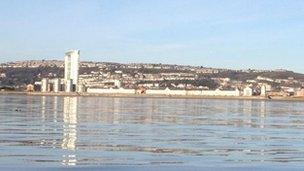Swansea City: Premier League 'worth £58m' to economy
- Published
The Swans became the first Welsh club to reach the Premier League in 2011
Swansea City's first season in the Premier League has generated £58m for the Welsh economy, a new study claims.
An estimated 400 jobs - 340 of them in Swansea - were created or protected by top flight football, according to the research by Cardiff University.
The study was commissioned to look at the economic impact of Premier League status on the city and Wales.
The Swans became the first Welsh club to reach the Premier League in May 2011.
Having started last season as one of the favourites for relegation, the club shocked many pundits by beating the eventual Premier League champions Manchester City and Arsenal, and drawing with Chelsea and Tottenham Hotspur.
Swansea are currently ninth in the Premier League this season, and are preparing to play Arsenal in the FA Cup on Sunday.
And off the pitch, hotels, pubs, the city council and chamber of commerce have reported increased activity since 2011, the report says.
It also suggests that while the majority of the economic value was created directly by the football club, most of the jobs created and safeguarded were from "non-footballing activity".
The most significant element of this was the spending power of away fans who visited pubs, clubs and restaurants and stayed in hotels as a direct result of visiting Swansea City's Liberty Stadium.
Information was provided by the club itself and supporters who completed surveys at the end of last season about their spending patterns.
One of the report authors, Prof Max Munday of Cardiff Business School, said he was surprised by the impact on the local economy from those attending games.
"The club employs 125 people and we estimate that the visitor spending and the club non-wage and wage spending support a further 295 full-time jobs," he said.
"So we estimate that the total regional impact is about 420 jobs with much of that in the Swansea area."
He said the rewards would be even greater if Swansea could establish themselves in the Premier League and even qualify for European competition.
"There's a strong expectation that the economic impacts will increase going forward particularly because one might expect in the future that the ground could expand and as they do better we would hope there would be success in more competitions," he said.
"We've got the FA Cup this weekend and the club is ninth in the Premier League which is a very strong performance.
"As they go on we would expect the increase in visitor spending to continue.
"Hopefully they're not a million miles away from a European spot. If you get into that sort of football, the proportion of visitor spending goes up markedly."
Business Minister Edwina Hart said: "I welcome the results of this latest economic impact study, which tracks the local economic benefits of the thousands of football fans who attended Premier League matches at the Liberty Stadium last season.
"Swansea City FC's promotion and success in the Premier League has also exposed Wales to a worldwide television audience and provided the Welsh government with rich opportunities to promote our economic development and tourism messages, not just for the Swansea region, but for Wales."
Nick Bradley, Swansea council's cabinet member for regeneration, said the Swans' Premier League adventure had been an incredible success story.
"The value of the Swans' success to the local economy is even greater than Chelsea's widely-reported prize money for winning the Champions League this year," he added.
"That's an incredible achievement."
The director of South Wales Chamber of Commerce Graham Morgan said the figure of £58m had exceeded expectations.

"When Swansea were promoted to the Premier League we looked at what could be the potential impact on the city, and we compared it to Blackpool who had been promoted to the Premier League the season before," he said.
"We thought the Premier League would be worth £22m to Swansea, so £58m tops what we were expecting by quite a bit."
Mr Morgan said towns within a 50 to 100-mile radius of Swansea had benefited from the football club's success too.
"On average there's 2,000 to 3,000 visiting fans for every home game and they stay in the city or in the vicinity," he added.
"Work is starting to try and get these people to come back to the city at a later stage with their families.
'Mind-boggling'
"The Premier League is also watched around the world, so Swansea is hitting the international stage too.
"It is said there are in excess of 20 cameras for every home game and each game has the potential to be watched by a billion people around the world."
He said there was also anecdotal evidence that more meetings and conferences were being held at the Liberty Stadium since the club's Premier League promotion.
In May last year, Swansea council said activity on its Visit Swansea Bay website was up 44% on the previous year.
Hotel consultancy service PKF said hotel occupancy had risen 9% between September 2011 and March 2012, on the previous year, outperforming Wales and the rest of the UK.
But some people are not surprised the city's economy has benefited from the club's promotion to top flight.
Phil Sumbler, chairman of Swansea City Supporters' Trust, said: "The city and the club's profile has been raised by Swansea getting into the Premier League and that's bound to have economic benefits.
"The figure of £58m in quite mind-boggling, but the Premier League is the most-watched football league in the world so you'd expect the city to benefit off the back of that."
- Published13 May 2012
- Published31 May 2011